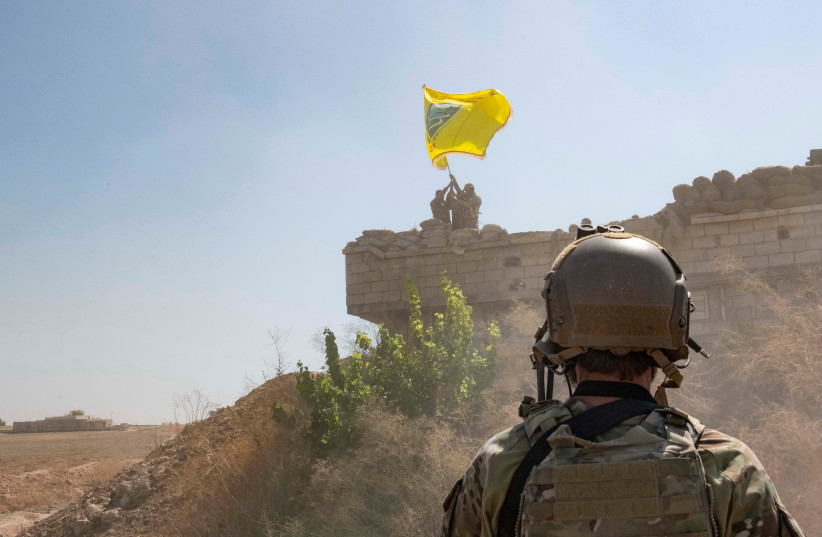Secretary of State Antony Blinken stated during his recent trip to Riyadh that the fight against ISIS is still ongoing and that the US appreciates Saudi Arabia’s continued contributions to the mission to defeat ISIS, the main component being the presence of US troops in northeast Syria. Blinken spoke alongside the top Saudi diplomat who oversaw efforts to restore Riyadh’s diplomatic ties with Syrian President Bashar Assad.
It is an encouraging sign that the US and its Arab allies are on the same page regarding the US mission in Syria, which serves as a reminder to Assad that the chaos he created continues to have consequences.
Turkey, on the other hand, is set to stay in northwest Syria due to its concerns over the growing power of the Syrian Kurds, the US partners in the fight against ISIS. Consequently, Assad won’t be able to revert to the pre-2011 status quo, since the US and Turkey Syria missions make it impossible for him to control more than one-third of the country, including the oil-rich part of Syria.
For the time being, keeping the US troops in northeast Syria is the right thing to do to ensure the defeat of ISIS and prevent Assad and the Russians from declaring a complete victory. But more diplomatic work should be done to ensure that the outcome of the war in Syria won’t contradict US national interests in the long term.

For the past three years, the Biden administration maintained the US mission in Syria, avoiding a sudden withdrawal that would have given Syria, Iran, Turkey, or ISIS a chance to fill the vacuum left by the US. However, it’s important for any American government to remember that the US presence in Syria cannot be used indefinitely to keep northeast Syria stable. And even while the US mission in northeastern Syria is not as controversial as the mission in Afghanistan, it is important to consider that if certain candidates win the 2024 elections, a pullout from Syria is very likely.
Therefore, it is crucial to make the most of the remaining time of the current mission in Syria to ensure that the years-long US investment in northeast Syria stability will serve the US interests, even in the event of a US withdrawal. And if the Biden administration wants to make tangible achievements in Syria, it’s important to think out of the box regarding the Syrian conflict.
Considering all the military and political dynamics in Syria, it’s important for Washington to shift its strategy of punitive isolation to a “step-by-step” diplomacy approach with Damascus to facilitate progress in negotiations and minimize humanitarian suffering.
It’s important to utilize the pressuring tools, including the sanctions and the US presence in northeast Syria, to drive political changes, facilitate the safe return of refugees, contain the illicit drug trade, and eliminate Iranian militia activities. To achieve these objectives, intensive diplomatic efforts with Arab nations that have reestablished ties with Assad are crucial.
How can a thriving economy eradicate civil issues in Syria?
SYRIA’S MULTITUDE of problems can be effectively addressed through the establishment of a robust economy. By promoting a strong economic environment in northeastern Syria, controlled by the Syrian Democratic Forces, pressure can be exerted on Assad to engage in fair negotiations with the Autonomous Administration of North and East Syria (AANES).
Economic stability in northeast Syria can force Assad to accept implementing a decentralized system that can give all the Syrian provinces, not only northeast Syria, more local powers and ultimately decrease Assad’s influence.
Pressuring Assad to make compromises that will lead to a decentralized Syrian political system will encourage millions of refugees to return when they know that the bloody regime they escaped doesn’t have full control of their areas.
As Assad desperately needs the resources and foreign currency, working to improve the northeast’s economy will increase his willingness to make political compromises with other rivals. He will be more inclined to uphold stability and refrain from starting new military campaigns for territorial gains once he sees northeast Syria, which already has trade ties with Damascus, prosper.
This rule can be applied to other areas in Syria where Assad doesn’t have full control, like Daraa and Swayda, in southwest Syria. Other Sunni-majority areas that suffered from Syrian, Iranian and Russian intensive military campaigns, like Homs and Aleppo, can also benefit from a decentralized system by engaging the Arab countries in our diplomatic campaign. The goal should be forcing Assad to give up some powers to local elected entities in these areas.
Slowly, but steadily, the US can influence the outcome of the Syrian crisis in a way that will advance US interests and lay the foundation for a Syria that is stable, more free and safe, where refugees, at least those who live in the neighboring countries, can return.
To achieve this result, the US must exert significant diplomatic effort on a number of fronts, including the Turkish one, to safeguard northeast Syria against another Turkish incursion that could jeopardize US goals. And since Turkish President Recep Tayyip Erdogan has been elected and is no longer subject to political pressure, he may be better positioned to sit down with the Kurds and negotiate a reasonable arrangement.
These are all realistic goals that would result in a historic diplomatic victory for the United States in the Middle East, without the need to commit American soldiers or topple existing governments.
The writer is a senior research fellow at the Philos Project.
